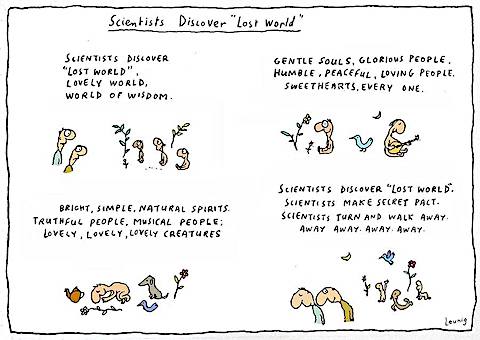
from Michael Leunig, of course
The recent end-of-year messages from most of my favourite writers have been pretty glum — the situation, they say, is hopeless, and inevitably going to get much worse (and without the “before it gets better” qualifier).
Well, yes, this is what collapse looks like. I’ve been writing about it for two decades, and while I’ve often hoped I was wrong, I’ve never been in denial about it. So I’m not glum at all. If we’re seeing the last years of human civilization, and if it’s going to be awful anyway, might as well get on with it, before the 8 billion humans on the planet make the rest of it uninhabitable for whichever species survive.
For me to wish it would hold off, at least where I live, until I’m no longer around to deal with it, would be pretty selfish. And I’m not at all prepared for it — the habits of neosurvivalism don’t seem to be in my conditioning.
Nature is beginning to perform radical surgery on a cancerous growth, with the survival of the patient very much in doubt. But while we are conditioned to convince ourselves that our current way of life, and of living on this planet, is wonderful, unprecedentedly worthwhile, as close to perfect as it has ever been, and the crown of our gods’ creation, I think we mostly instinctively know that it is not. We blew it, with the best of intentions, and the consequences of our failure are going to be severe.
But it is possible that, in a millennium or ten, when the dust clears, the survivors will emerge into a world that is unimaginably more joyful, less destructive, more alive, and more connected, than the current human experiment could ever have been. If I cannot be around to see that, I will content myself with knowing that, in my own incompetent human way, I might have paved the way a bit so that that astonishing future arrives a blink of the eye sooner. I nod to nature, to the gods, to the grand illusion of it all, for the opportunity to have done so.
COLLAPSE WATCH
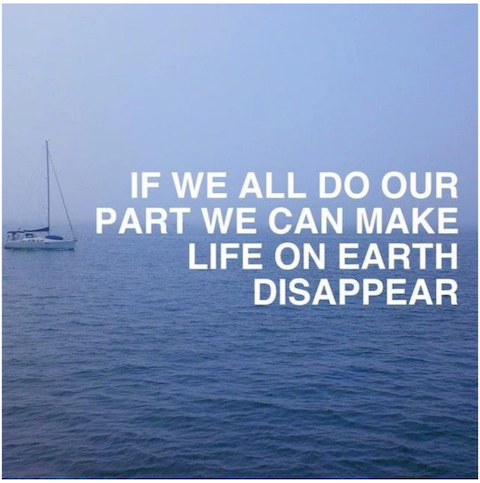
Facebook meme; thanks to Michael Dowd for the link
Economic collapse looms closer: I have always expected global economic collapse to precede ecological collapse in most of the world. It appears it is beginning. Tim Watkins explains why Britain is teetering, and how its collapse will spread to Europe. Aurélien describes how the Ukraine war is rapidly making EU countries into US vassal states, economically dependent on dubious American ‘largesse’. Michael Hudson explains how the current rapid deindustrialization of Europe will lead to its economic downfall. And Gail Tverberg forecasts an economic crash in 2023. Thanks to Paul Heft for these links and the Nate Hagens links below.
Once more, Limits to Growth 101: Tom Murphy recaps why climate change is just the tip of the (melting) iceberg of ecological collapse, and why technology can only make matters worse. Nate Hagens and Bill Rees bring us up to date on how we’ve long passed the stage when overshoot can be mitigated (transcript for the video-averse).
Running out of more than just oil: Geometallurgist Simon Michaud explains why ‘renewable’ energy at any scale requires more non-renewable metals than exist on the planet, and why our soils are now so depleted that there aren’t enough mineable fertilizers to compensate. And we’re running out of drinking water (transcript). The Honest Sorcerer confirms and elaborates.
Looming catastrophic drought in the US: Lambert Strether describes what the longest-known drought in US history means for its economy and future. And no, the recent California ‘atmospheric river’ hasn’t helped.
10ºC global temperature increase now ‘locked in’: So says James Hansen & co, per a review by Kate and Tristan. This is beyond catastrophic, entering Guy McPherson “Venusian Earth” territory. Full downloadable paper attached to the article.
LIVING BETTER

Harry Potter characters reset to Dostoyevski’s Russia; by Russian artist Vasily Polyakov using Midjourney AI software
The subversive joy of being a single mother: Lyz explains why it’s a better answer for many women than you might expect. Her most popular post of 2022. More gold from Lyz: Making magic in times of loss.
What if we built stuff to last?: Our current industrial economy is based on deliberately shoddy manufacturing and planned obsolescence. If consumers demanded strong right-to-repair laws, and a few pioneering companies in each industry set the example by making durable goods, we could cut our waste in half. Thanks to Kavana Tree Bressen for the link.
Replacing the body’s bad cells: Battle lines have been drawn over the new science of senolytics, drugs that single out and kill ‘senescent’ old cells that have started to malfunction, hopefully making room for new, healthy cells.
The obvious answer to homelessness: Duh. Build more affordable homes. It’s not such a ridiculous or impossible idea, if one takes off one’s capitalist blinkers. Thanks to John Whiting for the link.
Making sense of a senseless world: Daniel Schmachtenberger talks about sense-making and coping with complexity in a recent interview in Stockholm.
A physicist’s take on nuclear fusion: Despite the recent hype, its practical application is at least decades off, according to physicist Sabine Hossenfelder. But there are some interesting developments that might have earlier practical application in other areas.
POLITICS AND ECONOMICS AS USUAL
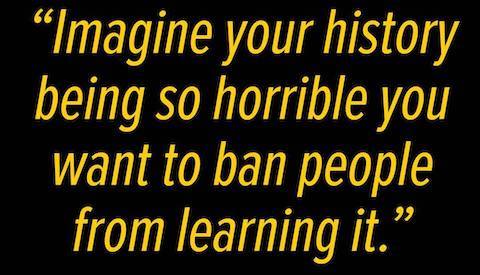
from the memebrary; original source unknown
Why the West is so ferociously anti-Russian: A deep and fascinating history lesson by blogger Aurélien, going all the way back to the Enlightenment, explaining why the Euro-American professional-managerial caste has such an enduring, ‘religious’ hate-on for all things Russian. And why the remaining Euro-American castes don’t share that visceral animosity. This is an important read IMO.
Corpocracy, Imperialism & Fascism: Short takes (thanks to John Whiting for most of these links):
- The war between animal rights activists and factory farmers is heating up
- Biden kills Senate resolution to end Yemen genocide
- The extremist “originalist” ideology held by the majority of the US Supreme Court threatens to cripple government regulatory power and wreck what’s left of American democracy
- Even NATO’s chief is nervous about the US military‘s actions in Ukraine and on Russian territory
- The Pentagon admits they can’t account for half of their assets
- US military and sanctions profiteering is wrecking Europe’s economy
- Sanctions against Russia are crippling Germany’s manufacturing
- Military “groomers” in US high schools aggressively exploit teachers’ requirement of ROTC training as a form of detention for misbehaviour
- The CIA is equipping and training NATO sleeper cells sabotaging infrastructure inside Russia
- An exhaustive expose on the CIA’s secret Zero Unit night raids that indiscriminately slaughtered thousands of Afghan civilians (in case you were wondering how Afghans could possibly prefer the Taliban to US occupation)
- Biden expands Trump law to expel citizens of three more Latin American countries
- Zelenskyy’s bloody war against the Ukrainian Orthodox church
- Britain’s National Health Service has substantially “collapsed”
Propaganda, Censorship, Misinformation and Disinformation: Short takes:
- Public support of Iranian and Chinese protestors doesn’t actually help those countries’ protestors or citizens (this is an important read on a little-discussed subject IMO)
- Zelenskyy delivers propaganda directly in US Congress, broadcast by all major networks just before launching a US-made drone attack inside Russia
- In Tigray, 10% of the population of 8M has been killed in the war, which is rarely covered in the news; millions more are starving to death
- Russia again announces its readiness for talks to end Ukraine war (but the western media quickly and universally add “they don’t really mean it”)
- Chinese-owned TikTok, often accused of censoring content seen by that country’s own citizens, has now started censoring content seen in the west, to conform to Pentagon, CIA and FBI demands
- A Danish reporter in Ukraine has been expelled after refusing to produce Ukrainian propaganda reports
- The little-known Hanford nuclear waste site in Washington is a time bomb waiting to go off, and has been designated the most toxic site in the US
CoVid-19 Corner: I think I said my piece, again, in my recent post on the pandemic. But Andrew Nikiforuk has some additional warnings, and Lambert Strether at Naked Capitalism has some more, too, just in case you think I exaggerate.
FUN AND INSPIRATION
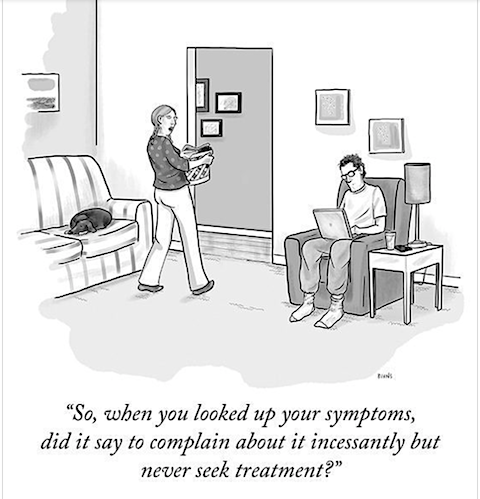
New Yorker cartoon by Teresa Burns Parkhurst
The business of lost things: Another amazing story from Lyz; this one brought tears to my eyes.
The Art Tatum Variation in Rachmaninoff’s Paganini Rhapsody?: Sergei was a fan of Art’s; did Art’s work inspire one of his variations?
A radically new genealogy of humanity: Are there a lot more early ancestors of humans, in a lot more places, than we’d thought possible? Thanks to Kavana Tree Bressen for the link.
The naughty most-watched video of all time: A paean to lust by Puerto Rican musician Luis Fonsa has been viewed 8 billion times, more than any other video (excluding children’s nursery songs). It contains the most hilarious euphemism for sex ever, in its lyrics, which translates to “Let me sign the walls of your labyrinth.”
Where are all the White Fridays?: The Beaverton deliciously skewers Jordan Peterson‘s incoherent hate-mongering rants.
Did language evolve to communicate tool construction methods?: A new book proposes a revolutionary and complex new view of human inventions and hence evolution.
Shakey Graves and Esme Patterson rattle your chains: The chemistry between the singers of this enormously fun song is palpable. Whew! Thanks to Lyz for the link.
Can dogs smell time?: Yes, and much more. Thanks to Kavana Tree Bressen for the link.
This is what happens when you don’t recycle your pizza boxes: If you’re that rare person who hasn’t seen Greta Thunberg’s perfect retort to the execrable Andrew Tate, Lyz takes it from the top.
THOUGHTS OF THE MONTH
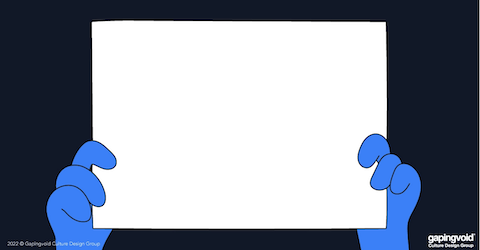
drawing by Hugh Macleod; protesters who have been censored or arrested for carrying “offensive” protest signs have taken to carrying blank protest signs instead — sometimes silence speaks louder than words
From Caitlin Johnstone, several takes on US politics:
Saying a US politician is bad on foreign policy but good on domestic policy is like saying a serial killer was nice to his family. It’s like, okay, who gives a fuck? They’re mass murderers! …
There really isn’t enough respect for just how much better the US is at propaganda than other nations. It’s completely incomparable in its power and effectiveness. Comparing Russian and Chinese propaganda to US propaganda is comparing baby scribbles to da Vinci. …
Criticizing the US-centralized empire with appropriate and proportional forcefulness and focus looks like treasonous support for enemy nations for the same reason sunlight would seem shocking and abrasive to someone who’s lived their whole life in a cave.
From Ronald Purser in McMindfulness:
Mindfulness is now all the rage. From celebrity endorsements to monks, neuroscientists and meditation coaches rubbing shoulders with CEOs at the World Economic Forum in Davos, it is clear that mindfulness has gone mainstream. Some have even called it a revolution.
But what if, instead of changing the world, mindfulness has become a banal form of capitalist spirituality that mindlessly avoids social and political transformation, reinforcing the neoliberal status quo? Instead of a so-called “mindfulness revolution,” corporations, schools, governments and the military have instead co-opted it as a technique for social control and self-pacification.
From Aurélien, in No Cheers for Authoritarianism:
What are Liberal states and leaders actually asking for people to fight for, or at least support, at the moment? Well, [take] Mr Stoltenberg, the Secretary General of NATO, whose speechwriters have him tweeting that [“authoritarian”] Russia and China “do not share our values” of democracy and freedom, and want a different world order, presumably of un-freedom and un-democracy, so we should view them as enemies…
Liberalism is, in its essence, a set of a priori assumptions about radical economic and social freedom, which tautologically can only apply to the individual. The term “liberal society” is not exactly an oxymoron, since you can have quite large numbers of individual liberals in a society, but it is quite close to it. This is unsurprising, when we consider that economic liberalism began as a movement among the new middle classes to take power and liberate themselves from regulation by the government, and social liberalism began as a movement among privileged middle-class youth to free themselves from regulation by their parents. You cannot, by definition, construct a society on that basis, although you can come quite close to destroying one, as all these individual freedoms come into conflict with each other and the most powerful individuals and groups get their way. And it’s pretty hard to get people to die for a society built on such ideas…
There is an influential tendency in Liberalism for which any state “interference” in the economy is by definition a form of tyranny. But it isn’t influential among ordinary people. For the most part, ordinary people look to the government to do more, rather than less, to protect them. They look to the government to regulate what needs regulating, and to try to ensure as far as possible a fair outcome for all. People also look to the government to respond to their needs and wishes, and become despondent and angry when the political process is co-opted by rival teams of professional politicians hitting each other over the head with tweets…
So I don’t think this latest initiative will work. People can bring themselves to die for noble causes: the end of the slavery system, for example, or the defence of the Spanish Republic, but Mr Stoltenberg’s speechwriters are going to have to do more than that to persuade western publics that “democracy” and “freedom” versus “authoritarianism” is the great political and ideological conflict of the twenty-first century.
From Kay Ryan, in Poetry 100 Years
NEW ROOMS
The mind must
set itself up
wherever it goes
and it would be
most convenient
to impose its
old rooms—just
tack them up
like an interior
tent. Oh but
the new holes
aren’t where
the windows
went.
From William Stafford in Ohio Review:
ANY MORNING
Just lying on the couch and being happy.
Only humming a little, the quiet sound in the head.
Trouble is busy elsewhere at the moment, it has
so much to do in the world.
People who might judge are mostly asleep; they can’t
monitor you all the time, and sometimes they forget.
When dawn flows over the hedge you can
get up and act busy.
Little corners like this, pieces of Heaven
left lying around, can be picked up and saved.
People won’t even see that you have them,
they are so light and easy to hide.
Later in the day you can act like the others.
You can shake your head. You can frown.





Plenty of interesting reading. Thanks. I’m especially looking forward to the anti Russian explainer.
The anti Russia hysterics are clearly pathological & most of my family & friends partake. When conversing, I do all within my abilities to avoid Putin or Russia because when they start in on it it’s like being in the midst of a conversation with a reasonably intelligent adult who suddenly swallows a fast acting stupid pill.
As for cleaning your cells you can do that yourself by fasting which will trigger autophagy.
What is autophagy?
Autophagy (pronounced “ah-TAH-fah-gee”) is your body’s process of reusing old and damaged cell parts. Cells are the basic building blocks of every tissue and organ in your body. Each cell contains multiple parts that keep it functioning. Over time, these parts can become defective or stop working. They become litter, or junk, inside an otherwise healthy cell.
Autophagy is your body’s cellular recycling system. It allows a cell to disassemble its junk parts and repurpose the salvageable bits and pieces into new, usable cell parts. A cell can discard the parts it doesn’t need.
Autophagy is also quality control for your cells. Too many junk components in a cell take up space and can slow or prevent a cell from functioning correctly. Autophagy remakes the clutter into the selected cell components you need, optimizing your cells’ performance.
https://my.clevelandclinic.org/health/articles/24058-autophagy
Thanks Dr S — curious to know what kinds of fasting you’ve tried. I know NutritionFacts.org has reported on the health benefits (mostly about weight loss but also for disease resistance), but he’s pretty vague about which types are best. I’ve seen everything from “anything less than 10 days is useless” to “eating 2 meals a day within 8 hours and fasting the remaining 16 each day is just as good as water-only long-term fasting”.
Hi Dave. I’ve done a handful of 4-5 day fasts & even did one for 9 days. In addition to drinking loads of water, I drank coffee & diet pop. I also took extra electrolytes: magnesium (citrate – pills or powder), potassium (‘No Salt’) & baking soda. These are easily mixed with water, absorbable & the cheapest way I could come up with.
Many people who have documented their long term fasts on YouTube claimed they never took any electrolytes, but each to his own.
I still fast, but I just do intermittent fasting 30-36hrs. Don’t eat anything all day, hit the sack and the next day you don’t eat until dinner time. Some do that over & over for fat loss. I find it has a very low discomfort level for me.
It works almost as good as long term fasting for fat loss, but without the long term fasting side effects and you still give your body many fruitful hours in autophagy. I like to imagine autophagy as pacman running inside me gobbling up dead cell.
The side effect I hate when long term fasting is short sleeps with roller coaster fatigue to hyperness. The body produces a neuropeptide called Orexin ( hypocretin) that regulates wakefulness, and appetite. After 2-3 days fasting I feel hyped up & can’t relax.
It’s one of evolution’s survival tricks to keep you jacked up to go hunting & gathering even though your tank’s been empty for days/weeks/ months. The body switches to burning your stored fuel{fat}, so how long you can fast for primarily depends on how much fat you have. There’s a few documented cases of people who have not eaten in over a year and are no worse for wear, but I would not recommend it. I’ve seen a study that showed fasting subjects only lose 4% muscle whereas calorie restricted subjects lost more. Another evolutionary survival trick.
Dr Karl’s Great Moments In Science
A year without food
“He ended up fasting for one year and 17 days — that’s right, he ate no food at all for over a year. He lived entirely off his copious body fat, in the end losing about 125 kilograms of weight.”
https://www.abc.net.au/science/articles/2012/07/24/3549931.htm
I learned many things about fasting in a book by Canadian nephrologist Dr Jason Fung.
His website and videos are a wealth of fasting & health info.
https://www.dietdoctor.com/authors/dr-jason-fung-m-d
One thing about Fung is he says many things most other Dr’s won’t. Least not in public.
You linked to a post on nakedcapitalism.com here (in which Michael Hudson predicts that Russia will likely win in Ukraine in the next month or two), as you’ve done before, and then I saw this (excellent) talk by blogger Doug Muder (the excerpt is from 57:14 to 1:00:02):
https://www.youtube.com/watch?v=BH382SMzckw&t=3434s
in which he notes that that site has been predicting that Ukraine would fall in a month or two repeatedly ever since the invasion began. Would you agree that the site is untrustworthy and its posts shouldn’t be spread?